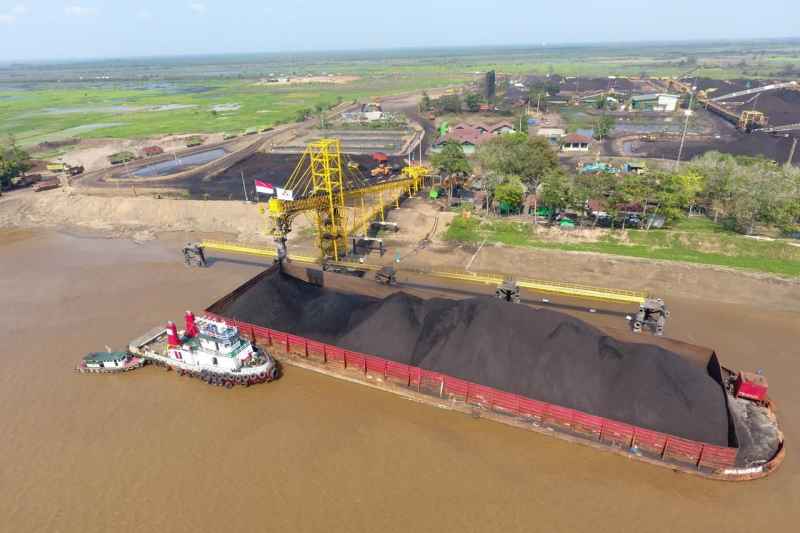PT Titan Infra Sejahtera (TIS), a mining infrastructure service provider in South Sumatra, has announced plans for an initial public offering (IPO) in 2025. This move aligns with the company's optimism about the growth of coal infrastructure in South Sumatra, driven by increasing global demand and a market shift from Kalimantan to Sumatra. With two subsidiaries managing coal hauling roads and loading ports, TIS positions itself as a key player in supporting Indonesia's energy commodity exports.
Infrastructure as the Business Foundation
TIS operates through two subsidiaries: PT Servo Lintas Raya (SLR), which manages a 118-kilometer (KM) hauling road, and PT Swarnadwipa Dermaga Jaya (SDJ), which operates a coal port on the Musi River. These infrastructures serve as the backbone for coal distribution from mines in South Sumatra to international markets.
Victor B. Tanuadji, President Director of SLR and SDJ, emphasized that TIS’s focus on infrastructure rather than mining itself adds value for investors concerned about environmental issues. "We are not directly involved in mining. Our business ensures efficient coal distribution through hauling roads and ports. This makes our portfolio more sustainable and aligned with ESG (Environmental, Social, and Governance) trends," he stated.
This statement is relevant amid global pressure on the coal industry, which is often criticized for environmental damage. By not owning mines, TIS potentially avoids negative stigma while still benefiting from strong coal demand, particularly from Asian countries such as India and China.
Financial Performance and Growth Projections
TIS's confidence in going public is backed by solid financial performance. In 2023, the company recorded an EBITDA (earnings before interest, taxes, depreciation, and amortization) of $100 million. This figure is projected to increase in 2024, driven by higher coal transport volumes.
Suryo Suwignjo, President Commissioner at PT Titan Infra Sejahtera, explained that TIS’s revenue directly correlates with the volume of coal passing through its infrastructure. In 2023, total volume reached 18 million tons, rising by 15% to 21 million tons in 2024. The company targets 27 million tons in 2025. "This growth is supported by port capacity expansion and the addition of new clients such as PT Bukit Asam Tbk," Suryo stated.
The partnership with Bukit Asam, a state-owned coal producer, marks a significant milestone. Since early 2024, Bukit Asam has been transporting its production via SLR’s hauling road and SDJ’s port. Victor believes this collaboration will intensify, especially given the stable thermal coal price at around $125 per ton.
Infrastructure Expansion to Anticipate Demand Surge
To prevent bottlenecks due to increasing volumes, TIS has expanded port capacity from two to three docks with five conveyor units in 2024. Plans include adding one more conveyor next year. This expansion will accelerate loading and unloading processes, reduce ship waiting times, and enhance supply chain efficiency.
"With adequate infrastructure, we can handle increasing demand without compromising service quality," Victor added. This initiative aligns with the Ministry of Energy and Mineral Resources’ projection that South Sumatra’s coal production will reach 131 million tons in 2024.
Market Shift: Sumatra as Indonesia’s Future Coal Hub
As the world's largest thermal coal exporter, Indonesia has long relied on production from Kalimantan. However, reserves there are depleting, and production costs—especially stripping ratio (overburden removal ratio)—are rising as mines age. Meanwhile, South Sumatra holds 9.3 billion tons of coal reserves (25% of the national total), which remain largely untapped.
Victor sees great opportunities in this dynamic. "As production costs in Kalimantan become less competitive, buyers will turn to Sumatra’s coal. We are ready with the infrastructure to ensure this commodity reaches the market," he said.
Coal mining in South Sumatra is concentrated in three regencies: Muara Enim, Lahat, and Ogan Komering Ulu. Muara Enim alone has 29 Mining Business Licenses (IUP), indicating long-term production potential.
IPO Strategy and Market Confidence
For its 2025 IPO, TIS plans to release at least 10% of its shares to the public. "This is the minimum requirement of the stock exchange. We are confident that the market response will be positive, given our clear business prospects and consistent financial performance," Suryo emphasized.
Capital market analysts predict that TIS’s valuation will be attractive, particularly because the company operates in the infrastructure sector, which generates stable revenue. This sector is also considered more resilient to volatility compared to direct mining operations.
Challenges and Future Prospects
Despite its optimism, TIS acknowledges challenges such as coal price fluctuations and government regulations on energy transition. However, the company believes that coal will remain a global energy backbone at least until 2040. "As long as demand from Asia remains strong, we will continue to grow," Victor stated.
Looking ahead, TIS plans to expand its infrastructure network, both in Sumatra and other potential regions. The company is also open to collaborations with more coal producers, including small and medium-sized players.
The IPO of PT Titan Infra Sejahtera is not just a move to raise fresh capital but also a commitment to strengthening its position in Indonesia’s coal industry. By focusing on sustainable infrastructure, TIS aims to bridge economic needs with environmental responsibility.
Amid the global energy transition, TIS’s strategy demonstrates that efficient and environmentally friendly infrastructure can be the key to the future of the coal industry. If this plan succeeds, the company will not only set an example of a successful IPO but also become a pioneer in integrating ESG principles into Indonesia’s mining business.
 PT Titan Infra Sejahtera (TIS) Prepares for 2025 IPO, Enhancing Coal Loading and Unloading Infrastructure
PT Titan Infra Sejahtera (TIS) Prepares for 2025 IPO, Enhancing Coal Loading and Unloading Infrastructure